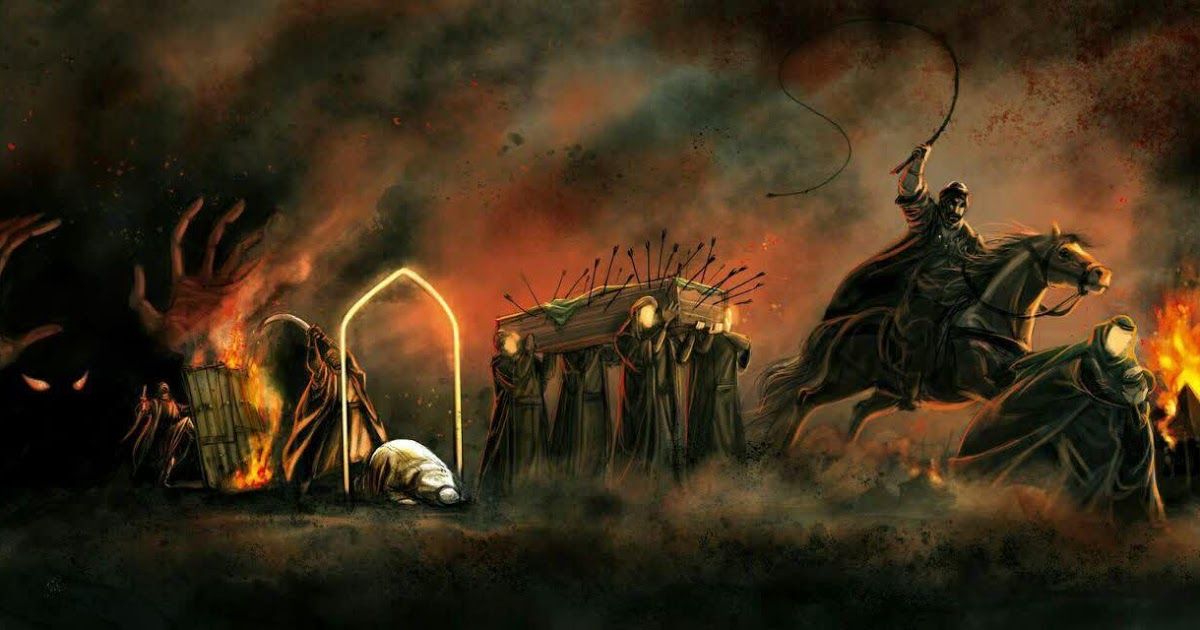In the context of Muharram, almost everyone knows who Husain is, but not many know the name of Zainab (A.S), or the fact that had it not been for her, Husain wouldn’t have been known.
According to Nayadaur.tv, without Zainab’s speeches and sermons, Husain would have been dismissed as a mere rebel fighting against the ruler of the time. Husain, his male relatives and companions had been martyred in Karbala, Iraq on this day (10th Muharram) in 61 Hijri /680 AD.
Husain’s war over evil was over, and he went to heaven victorious. Now it was his sister Zainab’s war to fight, and this was not a ten-day war but a prolonged one. Zainab was destined to triumph and become a feminist icon for generations of men and women to come.
On the 11th Muharram, the women, children and Husain’s son Zain-ul Abidin were captured by Yezid’s victorious army and taken to the court of Ubayd Allah ibn Ziyad, Governor of Kufa.
Kufa was the city where Zainab had lived with her father and siblings. This was the city where her father Ali had been the Caliph and his daughters, the princesses. This was the city where Zainab and her sister Umme Kulsum held classes for the women to teach them the exegesis of the Quran and Hadith of her grandfather. It was here that they were brought as captives on unsaddled camels, unveiled, disheveled and in a state of extreme sorrow.
As the caravan entered the city of Kufa and the hordes of spectators came to gawk at what they thought were the family of the slain rebels, Zainab gave her first sermon.
There was a tumult in the city and some one asked, “Who are they?” Zainab identified her caravan as the descendants of the Holy Prophet, and because her voice could not be heard over the noise, she urged them to be quiet. The spectators were left breathless as the daughter of Ali spoke in the same tone and tenor as her father.
The following day, the prisoners from the Prophet’s family were produced in court. The Governor ibn Ziyad did not recognize Zainab in her disheveled (yet confident) state, and asked her to identify herself.
She drew herself up and said, “I am Zainab bint Ali.” When ibn Ziyad mocked her for being in the state she was in, she said quietly and firmly that it was he who had been disgraced for his evil actions and he would find out soon enough. She was blessed to be the daughter of Ali and the granddaughter of the Prophet, and to be the sister of Husain who had attained martyrdom in the way of Allah.
The Journey to Damascus
It was a cruel winter when Zainab and the other captives began the difficult 750-mile journey to Damascus. They had to take the longer and less frequented route for fear of rebellion, as stories of Yezid’s actions against the Prophet’s grandson and family were beginning to percolate to Iraq. It fell to Zainab, Umme Kulsum and Zain-ul Abidin to bury the children who died on this arduous journey and comfort the grieving mothers.
Wherever a crowd gathered along the way, Zainab, Zain-ul Abidin, Umme Kulsum and Fatima Kubra (daughter of Husain) gave fiery speeches, informing the people of their lineage, of Husain’s fight, and the trials they had to undergo.
Arrival in Damascus
When they reached the outskirts of Damascus, they were ordered to wait for 72 hours in the main square of the souq (market) just outside the Grand Mosque while the court was being decorated to receive them.
Zainab once again addressed the people who had gathered to gape at them, on Husain’s fight and sacrifice, so that the rejoicing crowd would know that it was not a rebel’s defeat that they were celebrating.
In Yezid’s Court
Throughout the long journey, Zainab and the other captives had to bear the pain of seeing the severed heads of their slain relatives carried on spears by Yezid’s army. This was the norm of the victorious armies of the day. Even in the court of Yezid, Hussain’s head lay before them.
As the captives tied with a rope were led into the grand mosque towards the wooden balcony on which Yezid sat on a bejeweled throne, Zainab seemed to imbibe divine energy. The captives were herded together on a small platform in front of the throne. Yezid recited a couplet in praise of his victory and mocked Zainab and Zain-ul Abidin.
The captives were quickly moved to a ruined house where they were kept imprisoned for around a year. Zainab was once again the pillar of strength for the women and children, and her nephew. Amidst murmurs of dissent and disapproval, Yezid offered release to Zain-ul Abidin. He consulted his aunt as usual. Zainab asked that the heads of their martyred relatives be returned to them and a house be given to them where they could mourn their dead.
She had returned to Medina altered, her hair white and her back bent, but determined to let the world know of her brother’s sacrifice. The real victory of Zainab the ‘Lion Heart’ lies in the fact that she ensured that her brother’s sacrifice is remembered even today and that Islam, as brought to us by the Prophet, was not altered or tampered with by Yezid.
Rana Safvi

